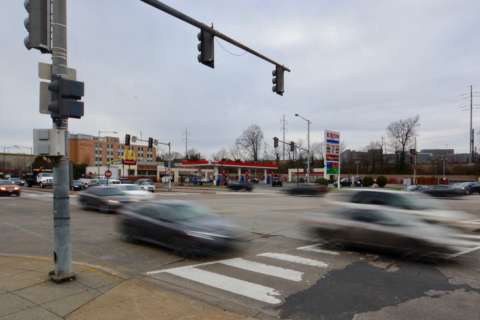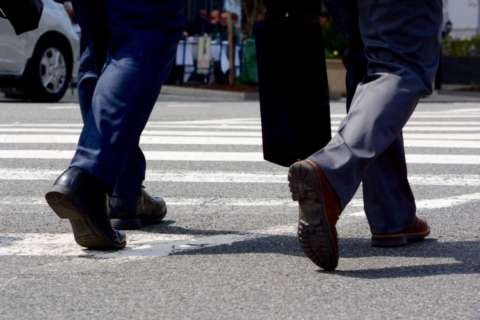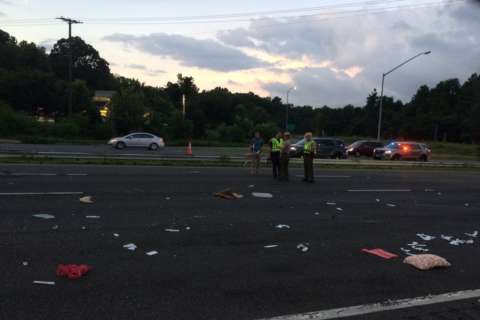WASHINGTON — More people are getting hurt or killed as traffic crashes increase across the Washington area, and a significant number of fatal crashes are tied to alcohol or drugs, a new report finds.
A Washington Regional Alcohol Program report, due to be presented to the Metropolitan Washington Council of Governments Wednesday, finds that more than 39,000 people were hurt in traffic crashes across the region in 2016; 245 people died.
Overall traffic deaths increased significantly in Northern Virginia in 2016, the most recent year that complete data is available. Traffic deaths rose slightly in the District, and dropped in Montgomery and Prince George’s counties.
Kurt Erickson, president of the nonprofit commonly known as WRAP, said the increases in crashes and deaths are outpacing population growth.
There were more than 92,000 total traffic crashes across the region, not including parts of Maryland outside Montgomery and Prince George’s counties. About 4,400 of the crashes were blamed on drugs or alcohol, while others were tied to distracted driving and other causes.
People under 21 are also driving impaired. The report finds three alcohol-related deaths in crashes with drivers under 21, as well as 331 crashes, 194 injuries, and 568 arrests.
Recently released nationwide estimates for traffic deaths the following year, 2017, by the National Safety Council project 40,100 people were killed in car crashes. That group estimates 4.57 million people were injured seriously enough to require medical attention in 2017.
Nearly 1 in 4 deaths tied to drugs, alcohol impairment
Nearly one in four 2016 traffic deaths in the Washington area was tied to drivers found to be under the influence of drugs or alcohol beyond legal limits.
While that is a significant decrease compared to the previous year’s numbers, crashes and injuries that people survived that were tied to alcohol or drugs increased across the region.
“These are 100 percent preventable incidents, whether they be fatalities, crashes injuries or an arrest. We should be able to lick this problem,” Erickson said.
But he describes the report as a traditional mixed bag of results on drunken driving.
“The good news is that drunken driving fatalities throughout the Washington metropolitan area are not just down — they’re down by double-digit percentages; they’re down for the second consecutive year, and that’s great, and they’re outpacing what’s happening at the national level where such fatalities are actually on the rise. The mixed-bag part of this is that’s countered by the fact that locally occurring drunken driving crashes are up; locally occurring drunken driving injuries are up,” Erickson said.
Arrests for impaired driving decreased slightly between 2015 and 2016 to 14,398, which Erickson described as still a staggering number.
“Drunken driving arrests … are actually down for the third consecutive year. Normally that would be good, but if it’s coming in the face of increasing crashes and injuries, that’s where it becomes a concern,” Erickson said.
Montgomery County reported the most alcohol-related traffic arrests of any jurisdiction. Prince George’s County and Fairfax County, second and third, reported about two-thirds as many arrests.
“It’s a sad reality that there are more drunken drivers than there are men and women in uniform looking for them,” he said.
Suggestions to address that include more sobriety checkpoints, more patrols, and an emphasis on anti-drunk driving campaigns that push calling a cab, Uber or Lyft.
“I think we’re also starting, hopefully, to see the dividends of initial interlock, where Virginia passed such legislation mandating that all offenders get these in-car breathalyzers in their vehicles in 2012; Maryland and D.C. didn’t implement it fully until 2016,” Erickson said.
His organization sponsors the SoberRide program, including for this weekend’s St. Patrick’s Day festivities.
A limited number of $15 Lyft credits are available between 4 p.m. Saturday, March 17, and 4 a.m. Sunday, March 18, with a promo code that they plan to post Saturday afternoon.
Last year, SoberRide shifted from providing cab rides to people who called a dedicated phone number to offering Lyft credits, which Erickson said increased the use of the program threefold.







